
- Home
- News
- Analysis
- States
- Perspective
- Videos
- Education
- Entertainment
- Elections
- World Cup 2023
- Features
- Health
- Business
- Series
- Economy Series
- Earth Day
- Kashmir’s Frozen Turbulence
- India@75
- The legend of Ramjanmabhoomi
- Liberalisation@30
- How to tame a dragon
- Celebrating biodiversity
- Farm Matters
- 50 days of solitude
- Bringing Migrants Home
- Budget 2020
- Jharkhand Votes
- The Federal Investigates
- The Federal Impact
- Vanishing Sand
- Gandhi @ 150
- Andhra Today
- Field report
- Operation Gulmarg
- Pandemic @1 Mn in India
- The Federal Year-End
- The Zero Year
- Premium
- Science
- Brand studio
- Home
- NewsNews
- Analysis
- StatesStates
- PerspectivePerspective
- VideosVideos
- Entertainment
- ElectionsElections
- Sports
- Loading...
Sports - Features
- BusinessBusiness
- Premium
- Loading...
Premium
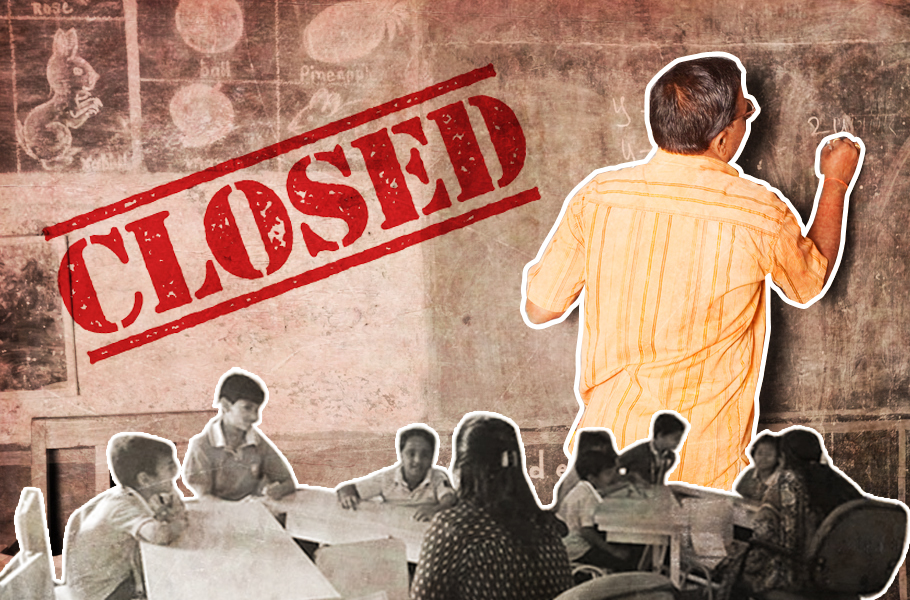
Small private schools face permanent closure, teachers in limbo

Ashok Gowda, an architect-turned-entrepreneur, wanted to set up 10 schools in 10 years in Bengaluru. But with stiff competition and with reasonable profit, he managed to open and run three—a play school, a primary school with a state board syllabus and another with central board syllabus—in the suburbs of the city between 2013 and 2020. Gowda’s schools catered to students whose parents...
Ashok Gowda, an architect-turned-entrepreneur, wanted to set up 10 schools in 10 years in Bengaluru. But with stiff competition and with reasonable profit, he managed to open and run three—a play school, a primary school with a state board syllabus and another with central board syllabus—in the suburbs of the city between 2013 and 2020.
Gowda’s schools catered to students whose parents came from diverse professions—farmers, IT professionals, daily-wage labourers among others.
All was going fine till the COVID-19 pandemic hit. Schools had to be shut, classes went online, with many students not having proper technology or devices, making it difficult to impart lessons. But the worst came when parents refused to pay school fees.
He was forced to shut one of the schools started in 2017 with 100 students, run under the brand name Bodhi and managed by his educational trust (KME Trust) in the suburbs of Bangalore.
Of the 17 employees (13 teaching and 4 non-teaching), Gowda says he laid off a third of his staff in one of the schools that he shut and got others to work with 40-50% pay cuts even as the COVID crisis deepened his financial burden.
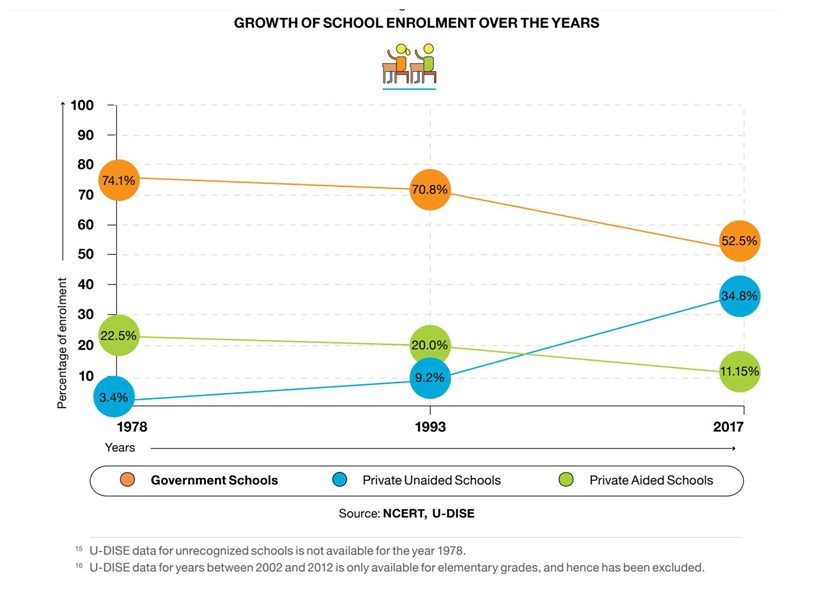
Apart from the ₹3 lakh for salaries of employees every month, Gowda had to maintain the 26,000 sqft building and 1 acre of land, meant for playground and other activities, for which, he says, it would cost ₹60,000 a month.
But when the COVID pandemic struck, he was yet to get around ₹5 lakh for the state board school and about ₹35 lakh for the last academic year for the other school, which is still running.
Boom that went bust
With the rise in disposable incomes, a growing aspiration for a better education and brand consciousness, the country witnessed a boom in private school education. Independent of the government, they were financed either philanthropically or by institutional investors, or were totally dependent on fees paid by parents. It also led to the rise of pre-schools (early childhood care) in every nook and corner of urban areas, with women entrepreneurs taking the lead.
In the 25 years till 2017, the enrolment in private schools increased from 9.2 per cent in 1993 to 34.2 percent in 2017, according to a report by Central Square Foundation based on government data.
The report also noted that contrary to popular perception, most private schools charged low fees schools (at around ₹500 a month) across urban and rural India.
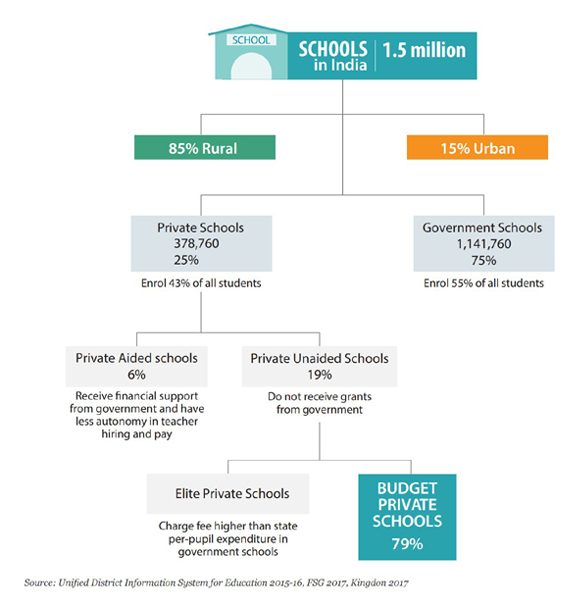
But the COVID crisis deepened the problem for many budget private schools and dashed the hopes of entrepreneurs. While one gets to read news reports about complaints against certain schools overcharging or forcing parents to pay fees for the full term, budget schools, which mostly collected fees on a quarterly or monthly basis, were the worst affected.
A lot of parents have been unable to pay fees, due to job loss or pay cuts as a result of COVID lockdown-induced economic crisis, and managements are finding it difficult to generate revenues to keep the schools running. Several parents have shifted their wards to government schools.
Another entrepreneur Sridhar who runs Aniketan Public School in Hongasandra in Bangalore shut one of his schools with 200 students this year. Sridhar said ₹40 lakh fees was due.
Unhelping govt
Besides, the government’s flip flops added to the schools’ miseries. Following protests by some parents, the Karnataka government in March issued a stricture to schools against forcing parents to pay the pending fees and directed them not to collect fees in the name of “online classes”, which were started in the wake of the lockdown.
In September, after teachers protested, the education minister Suresh Kumar urged all parents to pay the term fees without fail. Such confusing orders put everyone in a limbo.
“The education minister could have consulted all the stakeholders — teachers, parents, school management committees, block education officers and Deputy Director of Public Instruction and then taken a call, instead of resorting to knee jerk reactions,” Gowda says.
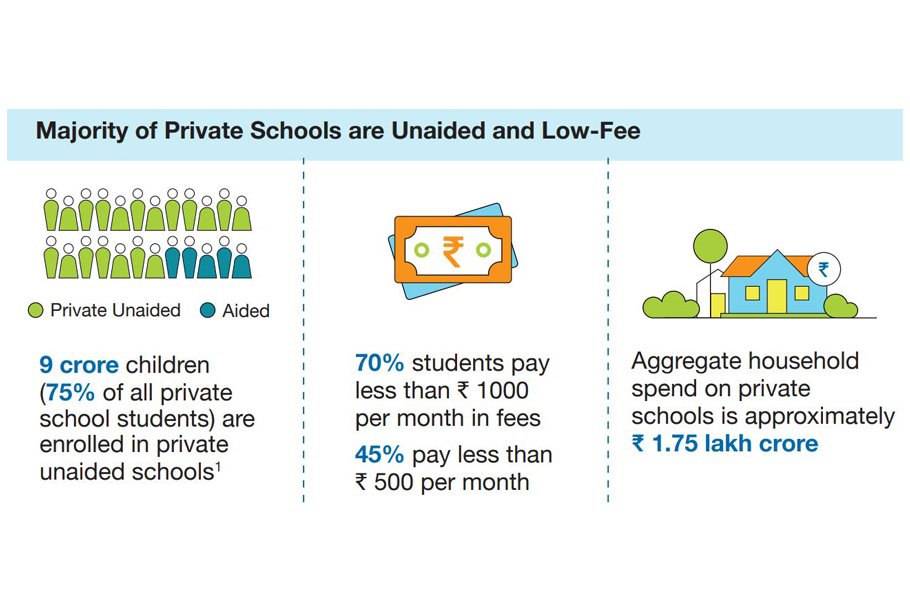
“We do understand the parents’ crisis and offer free education or impart education with lesser fees depending on a case to case basis. But how long can we sustain like that. How do we pay our teachers?” Sridhar asks.
“In India we have a socialist thinking that education should be free. But it’s a business with less than 8% profit margin and the market is highly competitive,” Gowda says. “We need money to keep the schools running. It’s an economic activity and school fees form a major component in it.”
Hundreds of pre-schools and private schools are up for sale on various e-market platforms.
Similar story in Telangana
Nearly 10,000 private budget schools in Telangana that charge less than ₹40,000 per student annually are staring at the prospect of closing down due to the coronavirus-induced financial crisis. The budget schools account for over 90 per cent of the total number of private schools in the state. About 20 lakh students are enrolled in these schools.
“Over 50 per cent of parents are yet to pay the fee for the academic year 2019- 20. Many schools have sacked teachers and nonteaching staff as they are not in a position to pay salaries. We do not even know how many students will come when the schools reopen,” says Telangana Recognised Schools Management Association (TRSMA) State organising president Sreedhar Reddy.
Most parents who send their children to these schools work in the unorganised sectors. With the educational institutions remaining shut since March this year, the budget schools have come under severe financial crisis.
The TRSMA has sought the government’s help in tiding over the crisis including exemption from property tax. It wants the government to give education vouchers worth ₹20,000 to private and government school students and ‘guru dakshina’ of ₹7,500 to teachers in private schools during the lockdown period. The association demanded extension or renewal of recognition till 2021-22 to all schools.
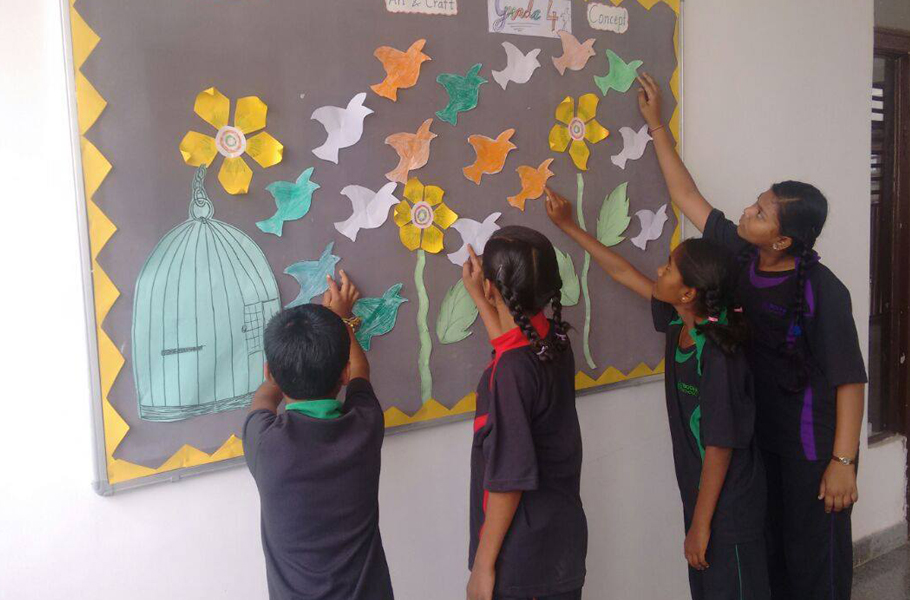
Prasanna Kumar, CEO of School Ventures that connects buyers and sellers of schools across the country and helps in school management, says pre-schools are the worst affected.
As per his estimate, about 30-40% of the 130,000 pre-schools, operated by women entrepreneurs with low investment and working capital funds, have been permanently shut due to COVID crisis.
In Bangalore alone, he says about 3,000 such schools and about 400-500 private state board schools, which collect fees on a monthly basis, have either shut down or are up for sale. He estimates that at least a lakh teachers and non-teaching staff are jobless in Karnataka alone.
Kumar says most of these schools ran on ₹2-5 lakh monthly expense and were largely dependent on school fees to meet their operational expenses to pay for building lease/rent, maintenance cost and teachers’ salaries and paying non-teaching staff.
He says schools collected the pending fees by holding the hall tickets, but with various state governments announcing no final exams last year, and most likely even this year, it’s become difficult for private schools to get the fees.
As his firm helps in buying and selling of schools, he says the distress is such that there are more schools on sale and there are less buyers. “Closures are not happening easily because the buyers have many options and they are negotiating their best. The number of private schools will come down and it would add pressure on the existing schools and government schools,” Kumar says.
Teachers too affected
The COVID crisis also rendered many teachers in private schools and non-teaching staff jobless. They struggle to cope with the crisis. Some teachers who lost jobs in Gowda’s school are working in the garment industry and other small scale industries in nearby areas.
Ramavtar singh, a private school teacher in Rajasthan’s Jaipur, took up manual labour job under the Mahatma Gandhi National Rural Employment Guarantee (MGNREGA) scheme. Maragani Rambabu, another private school principal took to selling idlis in Khammam district in Telangana. Wazir Singh, an English teacher in Delhi sold vegetables to make a living. Mohan M, a physical education teacher in a private school in Bengaluru Rural started to work as a painter.
Besides, several women entrepreneurs who started pre-schools have shut their institutions with lack of financial support.
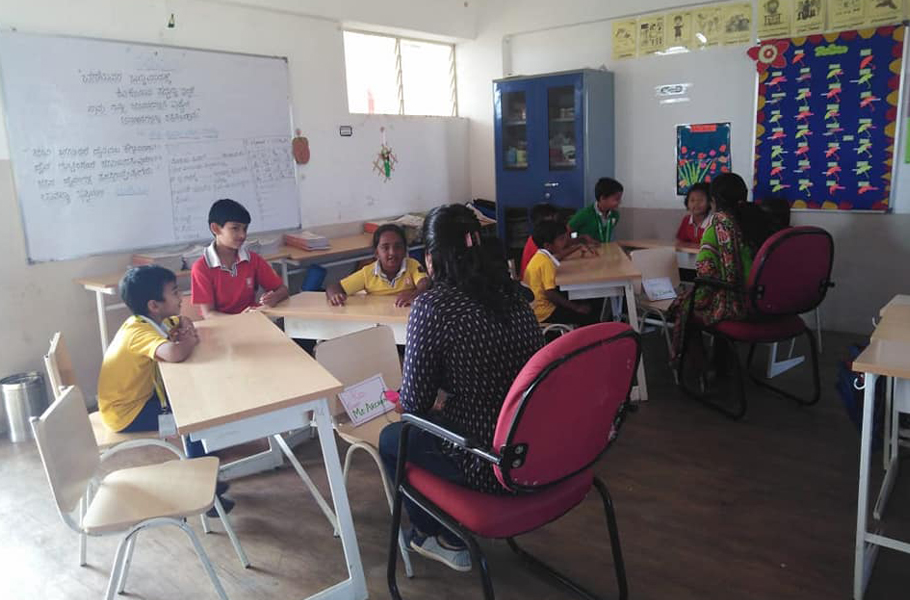
In Karnataka, hundreds of private school teachers from across districts descended on Bangalore and took to the streets, seeking financial aid from the government.
But teachers say the bigger impact of shutting down schools is not about job losses but on the learning abilities of school children.
Savitha Ramdas, a theatre and soft skills teacher at Edify School under the KME Trust, says not every student can learn through audio-video technology medium. Some require the physical presence of a teacher as they learn from what’s written on the board or by watching their peers.
But online education completely ignores these aspects and it becomes difficult for teachers to keep tab on the abilities and progress of students.
Another teacher Mangala Suresh says there are parents who still afraid to let their students out of their home due to COVID.
“The kid’s way of coping with it changes and parents and teachers need to tune to that change so as to ease the pressure on students,” she says.
As some students are jumping from private schools to government schools as parents cannot afford the fees, she also fears the shift will have a negative impact on the children.
Mangala, who’s been into teaching for 16 years, faces a 40-50% pay cut. She says it does affect her family budget as her husband’s business too is affected by COVID.
Prasanna Kumar, the school management consultant, says upskilling is a challenge for teachers, particularly for those in rural areas.
“Some who lost jobs managed to get employed in education platforms like Vendatu and Byju’s. But many are left in the lurch as they lack the right kind of communication skills,” he says.
Working with pay cut is better than sitting idle, says Mangala, as she hopes the situation will improve soon and salaries would be reinstated by the next academic year.
(With inputs from Suresh Dharur)

